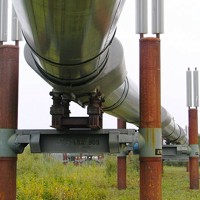In late-June, Turkey and Azerbaijan signed accords green-lighting the much-anticipated $7 billion Trans-Anatolian Pipeline (TANAP), which will ferry 16 billion cubic meters (bcm) of natural gas from Azerbaijan’s Shah Deniz II field through neighboring Georgia to Turkey and from there to European markets. While the deal has been described as a deathblow to the once highly touted European Union-backed Nabucco pipeline consortium, TANAP’s emergence alongside a host of other alternative and unconventional energy options is also endangering Russia’s near-monopoly in the European natural gas market.
In its original form, Nabucco, named for Verdi’s famous opera, was billed as a means of transporting natural gas from Azerbaijan’s Shah Deniz II and eventually Turkmenistan to the heart of Europe. But with sourcing commitments hard to nail down, the project has been left in limbo. Although TANAP, a less ambitious but far more realistic undertaking, does not technically rule out Nabucco, the two pipelines are inherently at odds. Many, including Turkish Energy Minister Taner Yildiz, have suggested rebranding Nabucco in a more limited role for the latest iteration of the pipeline.
“It would not be appropriate to say that [Nabucco] is over, but its concept and title will be changed,” said Yildiz in an interview with the Financial Times. “In the end I believe whatever the name of the project is, it is more important that it is doable.”

